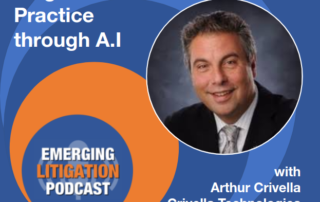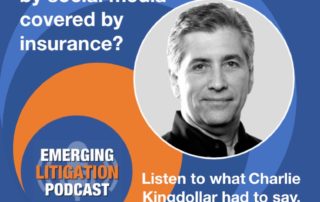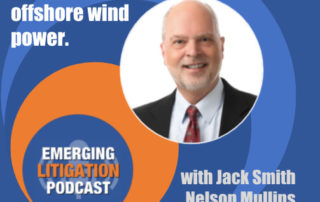Emerging Litigation Podcast
How Artificial Intelligence is Changing Litigation and Even Preventing it with Arthur Crivella
How Artificial Intelligence is Changing Litigation and Even Preventing it with Arthur Crivella Artificial intelligence has the capability to truly revolutionize how litigators work, and also how companies can avoid litigation in the first place. It can not only do the work of hundreds of people in mere seconds but can be used to predict liabilities before they become liabilities, and outcomes when disputes arise. Joining me to discuss the incredible present-day applications of AI in law and business, as well as the potential to do much more if humans will let it, is Arthur Crivella of Crivella Technologies Limited. For decades Art has been a leader in developing and applying advanced software engineering, systems engineering and AI methodologies, and holds numerous foundation patents in the field. Art has helped create nationally recognized engineering achievements in weaponry as well as in the metals, rubber and food industries. He was principal design engineer in developing advanced weapons direction systems and wrap-around simulation systems for naval guided missiles. Crivella Tech supports corporations in managing risk and law firms in assessing liabilities. The company also supports law firms in class action and mass tort litigation. This podcast is the audio companion to the Journal on Emerging Issues in Litigation, a collaborative project between HB Litigation Conferences and the Fastcase legal research family, which includes Full Court Press, Law Street Media, Docket Alarm and, most recently, Judicata. If you have comments or wish to participate in one our projects, or want to tell me how insightful and informative Art is, please drop me a note at Editor@LitigationConferences.com. I hope you enjoy the interview, particularly my observation that you cannot hurt a robot's feelings. --Tom Hagy
The Age of Social Disparagement with Charlie Kingdollar
The Age of Social Disparagement with Charlie Kingdollar It was my pleasure to interview Charlie Kingdollar for our first episode of the Emerging Litigation Podcast. Charlie spent more than four decades with General Reinsurance, three-quarters of which as the company’s Emerging Issues Officer. One colleague described him as “one of the most prescient and gifted industry futurists I have met in my 36 year professional career within the insurance industry. Entertaining and insightful, his ability to digest and communicate complex issues, many before they are readily apparent, is both a gift and a talent.” This interview is based on his article on social disparagement coming out in the inaugural issue of the Journal on Emerging Issues in Litigation in January 2021. The Journal is a collaborative project between HB and Fastcase. If you have comments or wish to participate in one our projects, or want to tell me how awesome Charlie is, drop me a note at Editor@LitigationConferences.com. We hope you enjoy the interview. Are the risks posed by social media — which has added jet fuel to one person’s ability to smear another — adequately addressed by the insurance market?
Offshore Wind Power Initiatives with Jack Smith
Offshore Wind Power Initiatives with Jack Smith Joining me to discuss this important subject is Jack Smith, a partner with Nelson Mullins in Charleston, South Carolina. Jack's practice includes hazardous waste site management and remediation, contaminated property liability negotiation, litigation, redevelopment and related regulatory counseling. He has also worked for several state and federal government environmental agencies. Jack earned his JD from the University of South Carolina School of Law and a BS in Psychology, also from the University of South Carolina. This podcast is the audio companion to the Journal on Emerging Issues in Litigation, a collaborative project between HB Litigation Conferences and the Fastcase legal research family, which includes Full Court Press, Law Street Media, Docket Alarm and, most recently, Judicata. If you have comments or wish to participate in one our projects, or want to tell me how insightful and informative Jack is, please drop me a note at Editor@LitigationConferences.com. This interview is based in part on an article Jack is writing for the Journal. I hope you enjoy the interview, and especially my solution for preventing birds from flying into windmills. I'm going to be rich. --Tom Hagy President Biden has called for the doubling of offshore wind energy capacity by 2030. To say the process for getting such projects up and running is complex is an understatement. There will be plenty of obstacles to the administration's lofty goal. Where will these impediments to development arise? What role will states play? How will NGOs react to this ambitious ramp-up?
A Shameless Plug for Our Content Services
Your content marketing is everything you’ve ever dreamed of. Right?

Critical Legal Content was founded by Tom Hagy, former Editor & Publisher of Mealey’s Litigation Reports and VP at LexisNexis, founder of HB, current litigation podcaster and editor-in-chief. CLC’s mission is to help smaller firms and service providers not only create content — blogs, articles, papers, webinars, podcasts (like the stuff on this site) — but also to get it out there. How? Via social media, this website, your website, and potential via our podcast and journal which we publish in collaboration with vLex Fastcase and Law Street Media. The goal is to attract readers and dizzy them with your brilliance.
*Inspired by actual events.
Create content like a real legal publisher.













